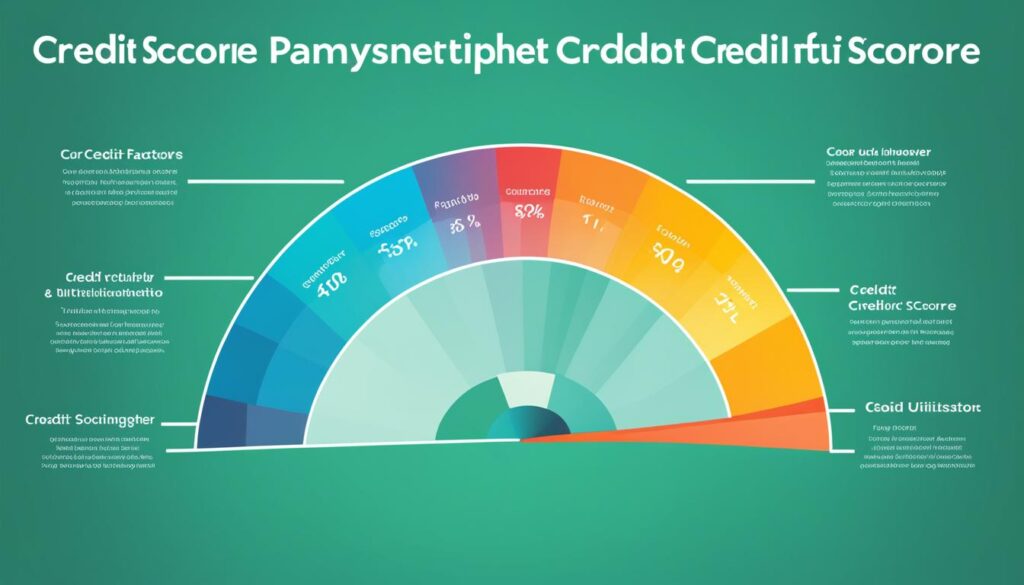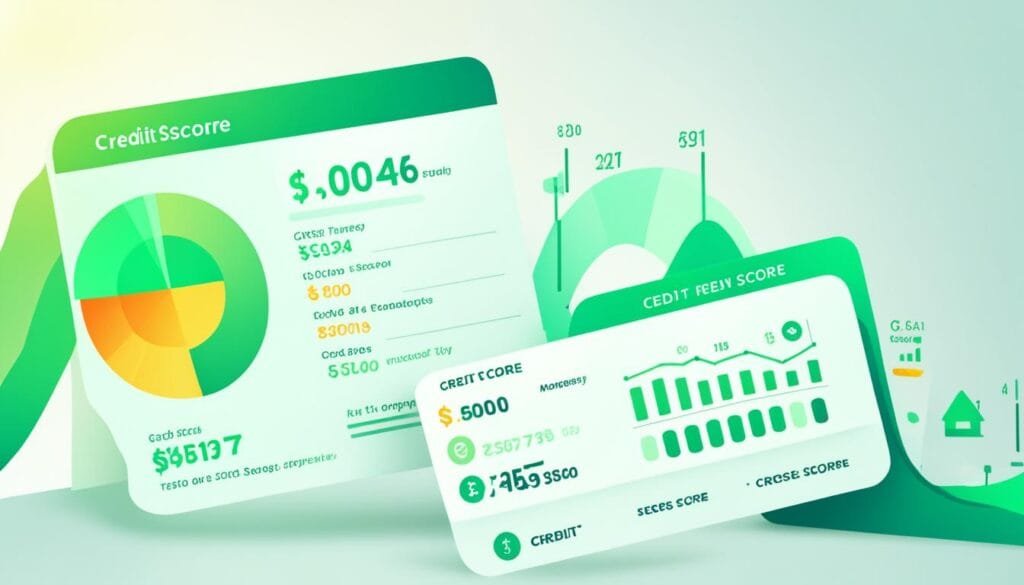Credit scores play a crucial role in various aspects of your financial life, such as obtaining loans, credit cards, and apartments. A higher credit score allows you to access more credit options and secure lower interest rates. It is important to understand how credit scores work and the credit score ranges. Credit scores range from 300 to 850 and are calculated using data from credit bureaus like Equifax, Experian, and TransUnion. There are two main scoring models used: FICO and VantageScore. Factors such as payment history and credit utilization significantly impact credit scores. The average credit score in the United States varies by scoring model.
Key Takeaways:
- Credit scores are vital for accessing financial opportunities and achieving favorable interest rates.
- Two main credit scoring models, FICO and VantageScore, are used to calculate credit scores.
- Factors such as payment history and credit utilization heavily affect credit scores.
- Credit scores range from 300 to 850, and the average score varies by scoring model.
- Understanding credit score calculation and ranges is essential for managing your financial well-being.
The Difference Between FICO Score and VantageScore
When it comes to credit scores, two popular scoring models stand out: the FICO score and the VantageScore. Understanding the difference between these two scoring models can help you navigate the world of credit more effectively.
Both the FICO score and the VantageScore use a credit score range of 300 to 850. This range allows lenders and consumers to assess creditworthiness and make informed financial decisions. While the score range is the same, the specific formulas used by each scoring model may differ slightly.
Despite these differences, both FICO and VantageScore are calculated based on data provided by credit bureaus, such as Equifax, Experian, and TransUnion. These models consider factors such as payment history, credit utilization, credit history length, credit mix, and new credit. By analyzing these data points, the scoring models determine an individual’s creditworthiness.
“The FICO score is the most widely known credit scoring model, while its main competitor is the VantageScore.”
Although there may be slight variations in credit scores calculated by FICO and VantageScore, the two models generally move in sync. This means that if your credit score increases or decreases on one model, it is likely to have a similar impact on the other.
To provide a clearer understanding of credit scores, here is a breakdown of the credit score ranges for both the FICO score and VantageScore:
| Credit Score Range | Credit Score Category |
|---|---|
| 300-579 | Poor |
| 580-669 | Fair |
| 670-739 | Good |
| 740-799 | Very Good |
| 800-850 | Exceptional |
It’s important to note that these credit score ranges may vary slightly depending on the version of the scoring model used. However, they provide a general framework for understanding creditworthiness.
Factors Affecting Credit Scores
Several factors play a role in determining credit scores. Understanding these factors can help you make informed decisions to improve and maintain a good credit standing. Here are the key elements that impact your credit score:
1. Payment History
Your payment history is a critical factor in determining your creditworthiness. Lenders assess whether you make payments on time and if you have any late or missed payments. Consistently paying your bills by their due dates demonstrates financial responsibility and can positively impact your credit score.
2. Credit Utilization
Credit utilization refers to the percentage of your available credit that you’re currently using. It is advisable to keep your credit card balances under 30% of the credit limit. Lower credit utilization suggests responsible credit management and can help boost your credit score.
3. Credit History
Credit history, or the length of time you’ve had credit accounts, is another crucial factor. Generally, the longer your credit history, the better. It allows lenders to assess your creditworthiness based on a significant period, giving them more confidence in your ability to manage credit responsibly.
4. Credit Mix
The diversity of your credit accounts is also taken into consideration when calculating your credit score. Having a mix of credit accounts, such as credit cards, loans, and mortgages, demonstrates your ability to handle different types of credit responsibilities. A well-rounded credit mix can positively impact your credit score.
5. New Credit
When you apply for new credit, it generates a credit inquiry, which temporarily affects your credit score. Multiple credit inquiries within a short period can raise concerns for lenders. To minimize the impact on your credit score, only apply for new credit when necessary and do so in moderation.
“Understanding the factors that affect your credit score empowers you to take proactive steps towards building and maintaining a strong credit profile.”
It’s important to note that factors such as race, ethnicity, sex, marital status, age, employment history, and residential address do not influence your credit score. Lenders focus solely on your credit behavior and financial responsibility when evaluating creditworthiness. By prioritizing good payment habits, managing your credit utilization, maintaining a positive credit history, diversifying your credit mix, and being mindful of new credit applications, you can effectively improve and maintain a solid credit score.

| Credit Score Factors | Description | Impact on Credit Score |
|---|---|---|
| Payment History | Track record of making timely payments | Significant impact; positive payment history boosts score |
| Credit Utilization | Percentage of available credit being used | High utilization can lower score; aim for under 30% |
| Credit History | Length of time you’ve had credit accounts | Longer credit history generally positively impacts score |
| Credit Mix | Diversity of credit accounts (credit cards, loans, etc.) | Having a varied credit mix can boost score |
| New Credit | Frequency of applying for new credit | Multiple inquiries within a short time can lower score |
Understanding Good Credit Scores and Their Benefits
A good credit score is a valuable asset that can open doors to various financial opportunities. Typically, a good credit score is considered to be 670 or higher. If you fall within the excellent credit score range of 800 to 850, you’re even more likely to reap the benefits.
Having a good or excellent credit score significantly increases your chances of loan approval. Lenders often set minimum credit score requirements, and meeting or exceeding them demonstrates your creditworthiness. Whether you’re applying for a mortgage, car loan, or personal loan, a good credit score can tilt the odds in your favor, ensuring you receive favorable terms and interest rates.
But why stop at loan approval when you can enjoy even more advantages?
Better Interest Rates on Loans
With a good credit score, lenders perceive you as a responsible borrower, reducing their perceived risk. Lower risk translates to better interest rates on loans. A good credit score can save you thousands of dollars in interest over the life of a loan.
“Having a good credit score opens up many opportunities in life, especially when it comes to securing the best interest rates on loans. It pays off to maintain a good credit score.” – Sarah Johnson, Financial Advisor
Access to the Best Rewards Credit Cards
Credit card rewards programs offer perks such as cash-back, travel rewards, and exclusive benefits. Many premium rewards credit cards are reserved for individuals with good or excellent credit scores. By achieving and maintaining a good credit score, you can unlock access to these coveted credit card rewards programs and enjoy the perks they offer.
The Table shows how credit scores impact loan approval and credit card rewards programs:
| Credit Score | Loan Approval | Credit Card Rewards |
|---|---|---|
| Excellent (800-850) | High approval odds | Wide range of premium rewards cards available |
| Good (670-799) | Good approval odds | Access to some rewards cards, though not as many as excellent scores |
| Fair (580-669) | Approval possible with higher interest rates and less favorable terms | Limited rewards card options |
| Poor (300-579) | Approval difficult, if not impossible, without a co-signer or collateral | Limited or no access to rewards programs |
These examples illustrate the correlation between credit scores and financial benefits. As you can see, a good credit score increases your chances of loan approval and grants you access to a wider selection of rewards credit cards.
Remember, specific credit score requirements may vary depending on the lender and the industry. However, maintaining a good credit score is universally beneficial and opens doors to a variety of financial opportunities.
So, aim for a good credit score and enjoy the advantages that come along with it!

How Do Credit Report Monitoring Services Impact Credit Score Calculations?
Credit report monitoring services can safeguard your credit score by alerting you to any suspicious activity that could negatively impact your score. By keeping a close eye on your credit report, you can identify and address any potential issues before they escalate, ultimately helping to maintain a healthy credit score.
Conclusion
Maintaining a good credit score is crucial for your financial well-being. By following a few key strategies, you can improve and maintain a good credit score, ensuring a solid foundation for your financial future.
To improve your credit score, make it a priority to pay all of your bills on time. Late or missed payments can have a significant negative impact on your credit score. Additionally, keeping your credit card balances low demonstrates responsible credit usage and can contribute to a higher score.
It’s also important to maintain a mix of credit accounts, such as credit cards and loans. This diversity shows lenders that you can manage different types of credit responsibly. Spacing out credit applications and avoiding too many inquiries within a short period can also help maintain a good score.
Regularly monitoring your credit score is key to staying informed about your financial health. If you notice any inaccuracies or errors on your report, take immediate steps to dispute and correct them. Furthermore, consider freezing your credit when necessary to protect yourself from identity theft and fraud.
By proactively taking these steps to improve and maintain your credit score, you can enhance your financial well-being, gain access to better loan rates and credit card rewards, and ultimately secure a more stable and prosperous future.
FAQ
How do credit score calculators work?
Credit score calculators use algorithms to analyze your credit history, including factors such as payment history, credit utilization, credit history length, types of credit, and recent credit inquiries. Based on this information, they estimate your credit score within a certain range.
Can I get a free credit score calculator?
Yes, many websites and financial institutions offer free credit score calculators. These calculators provide an estimate of your credit score based on the information you provide. However, keep in mind that the estimated score may not be the same as the one used by lenders.
How can I calculate my credit score?
While you can estimate your credit score using a credit score calculator, the most accurate way to calculate your credit score is to obtain a credit report from one of the major credit bureaus and review it for accuracy. You can request a free credit report once a year from each bureau through AnnualCreditReport.com.
What is the best credit score calculator?
The best credit score calculator is the one that aligns with the scoring model used by most lenders, which is the FICO score. However, it’s important to note that different credit score calculators may provide slightly different estimates since they may use different algorithms or consider different factors.
How often should I check my credit score?
It’s a good idea to check your credit score regularly to stay informed about your financial health. Experts recommend checking your credit score at least once a year or before applying for a major loan or credit card. Monitoring your credit score can help you catch any errors or fraudulent activity and take steps to improve it if necessary.
Why is a good credit score important?
A good credit score is important because it can help you qualify for loans, credit cards, and rental properties. It also enables you to secure better interest rates, which can save you money in the long run. Additionally, having a good credit score can give you access to the best rewards credit cards and other financial opportunities.
What is considered a good credit score?
A good credit score is typically considered to be 670 or higher. However, the specific credit score range may vary depending on the scoring model used by lenders. Keep in mind that different lenders may have different criteria for what they consider a “good” credit score.
How can I improve my credit score?
To improve your credit score, focus on making on-time payments, keeping your credit card balances low, maintaining a good credit history, and minimizing new credit applications. It’s also helpful to review your credit report for accuracy and address any errors or discrepancies that may negatively impact your score.
Can my credit score be affected by personal information such as race, age, or employment history?
No, your credit score cannot be affected by personal information such as race, age, sex, marital status, employment history, or residential address. Credit scores are calculated based on objective factors related to your credit history and financial behavior.
Can I build credit if I’m just starting out?
Yes, if you’re just starting out, you can build credit by opening a secured credit card or becoming an authorized user on someone else’s credit card. Making on-time payments and keeping your credit utilization low will help you establish a positive credit history over time.

